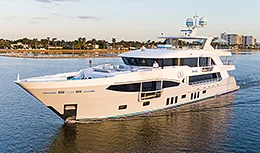- Alaskan Yachts
- Azimut Yachts
- Back Cove Yachts
- Beneteau Yachts
- Benetti Superyachts
- Bertram Yachts
- Boston Whaler
- Broward Yachts
- Buddy Davis Sportfish
- Burger Yachts
- Cabo Yachts
- Catamarans
- Carver Motoryachts
- Center Console
- Chris-Craft Yachts
- Cruisers Yachts
- DeFever Trawlers
- Dufour Sailboats
- Fairline Yachts
- Feadship Yachts
- Ferretti Yachts
- Filippetti Yachts
- Formula Yachts
- Fountaine Pajot Cats
- Grady-White
- Grand Banks Trawlers
- Hargrave Yachts
- Hatteras Yachts
- Hinckley Picnic Boats
- Horizon Yachts
- Hydra-Sports
- Intrepid Boats
- Jarrett Bay Sportfish
- Jeanneau Yachts
- Kadey-Krogen Trawlers
- Lazzara Yachts
- Lekker Boats
- Luhrs Sportfish
- Marlow Yachts
- Maritimo Yachts
- Marquis Yachts
- Mazu Yachts
- McKinna Motoryachts
- Meridian Yachts
- Midnight Express
- MJM Yachts
- Mochi Craft
- Neptunus Motoryachts
- Nordhavn Trawlers
- Nordic Tugs
- Numarine Yachts
- Ocean Alexander Yachts
- Ocean King
- Offshore Yachts
- Outer Reef
- Oyster Sailing Yachts
- Pacific Mariner Yachts
- Palmer Johnson Yachts

The Heroic Imagination Project: Finding Your Inner Hero
Some of the kids at Stanford High School in Connecticut don’t look to Marvel movies for their heroes; they look to their peers. The students are taking part in a pioneering new program that aims to bring out their inner hero–without the use of capes.
“There’s been a lot of interest from schools, because there’s a generation now that’s more minded towards activism – it’s kids feeling that kids can bring change,” explains Matt Langdon, Sydney-based founder of the Hero Round Table – akin to the TED Talks of heroism – and president of the Heroic Imagination Project. “But we’re also looking to boardrooms, institutions and anywhere where the ability to take action in tough situations is valued.”
This, it should be stressed, is not some New Age life coaching. It’s rooted in a growing scientific understanding of what makes one person act heroically, while another doesn’t. Why, in 2007, Wesley Autrey handed his children to a stranger and jumped onto subway tracks to help a flailing man who had suffered a seizure and fallen. And why, when it became clear he couldn’t lift him to safety in time, Autrey positioned the man between the rails, laid on top of him, and let the train pass over them both with an inch to spare. More specifically, he did this as 75 other commuters merely watched on.

That, and similar tales, always fascinated Professor Philip Zimbardo, founder of the Heroic Imagination Project. He’s best known as the eminent hero 44 — 45 psychologist behind 1971’s controversial Stanford Prison Experiment, in which participants were assigned roles as prisoners or guards in a mock prison, and soon fell into behaving to type.
“That experiment showed how easily good people can become those who do evil things,” he says. “But later it also got me thinking about alternatives. Why didn’t I intervene sooner to stop an experiment that had gone awry? What does it take to do the opposite – to act heroically?
“The whole program is anti-personality,” he adds. “It’s not playing to the idea that heroes are just born that way. The point is that heroism isn’t mystical. Anyone can be a hero – that if you have the awareness of someone in need and the ability to help, you will help. That opportunity doesn’t come along often, maybe once in a lifetime, maybe never, which almost by definition makes heroes exceptional people. But you can be ready for when that moment comes.”
As Langdon puts it, “courage can be cultivated”. The Heroic Imagination Project argues that, while personality type plays an uncertain part in heroism, nonetheless we can all be better primed for heroic acts through better understanding of the factors that might stop us: fear, of course, and fear of failure, even simple embarrassment; not wishing to make a stand that brings the attention of the crowd. There’s the so-called bystander effect, in which – as Autrey discovered – people are less likely to help a person in need if others are present.
There’s also the psychology of permission and authority, and the ‘fundamental attribution error’ – one reason we fail to help other people is our tendency to believe they, in some way, deserve what is happening to them. Peer group behavior is another factor: Langdon, in his work with schools, notes how less popular kids are less likely to take ‘heroic’ action out of concern for upsetting the peer group pecking order, a behavior that’s easy to correct once you understand that you’re subject to it.

Indeed, heroism is a hot topic in psychology. Recent studies suggest, counter-intuitively perhaps, that people who have accepted that they’re mortal are more likely to act heroically. A fascinating 2017 study conducted by Professor Daryl Van Tongeren of Hope College, Michigan, has found that just being exposed to superhero images – as opposed to neutral ones – was found to make people more helpful in completing a tedious task. And then there’s the role of status. Heroism is so deeply valued, a 2016 experiment found that people who were more willing to endure pain – by keeping their bare forearms dunked in ice water – were subsequently judged to be more likeable and were given a greater share of a money pot that other volunteers could divide up as they wanted.
“What’s clear is that heroism is not just being altruistic, as much as that’s needed in the world. And it’s not just about the kind of individual who rushes the bomber at the airport,” says Langdon. “We have to draw some distinction between the professional and the everyday person, but integral to heroism is there being some level of personal risk – physical or social – and acting anyway. This raises ethical questions of whether kids should be encouraged to act heroically in ways that might endanger them. We often forget we’re part of a collective that needs each other, but maybe the public isn’t ready for this yet. Society’s idea of what makes a ‘hero’ is in flux.”
“We bandy the term ‘hero’ about and tend not to apply it to people who deserve it.”
Indeed, the issue is torn. On one hand, heroic acts – whether that be whistleblowing at work knowing it will cost you your career or, as we’ve seen over the past two years, quietly helping your community despite the risk of infection – are more commonplace than we imagine. Zeno Franco, associate professor at the Medical College of Wisconsin, who studies the social psychology of heroic acts, speaks of “the banality of heroism”.
“We bandy the term ‘hero’ about and tend not to apply it to people who deserve it and, in other instances, give it to people who don’t want it,” says Franco. “We’re still working out what we mean by it, but I think there’s a distinction to be made between instinctive quick action, often in a situation that demands a physical response, and the kind of long enduring action we’ve seen during Covid. I think the media – and that may be the likes of TikTok now – has an important role to play in making us aware of heroism in this broader sense, and in educating young people to act heroically if needed.”
And yet, Franco stresses, as much as we admire heroes – they populate our best literature and drive Hollywood scripts, their stories helping to shape our conception of civilization – 21st century culture may be making them a rarity. Tech atomizes us, society’s structures encourage an inward-looking individualism and Covid, some claim, has boosted an endemic ‘safetyism’ that makes us willing to give up core social goods to avoid the smallest risk.
“The idea of children being out alone for the day and nobody knowing where they are just doesn’t happen anymore, for example, yet that’s the way things were when I was a kid, and I made it home every night,” says Franco. “Heroism doesn’t thrive in a completely risk-averse culture. We have to take that idea on.”
Request a Copy [FRANK Issue 3]
From intelligent debate to cutting-edge science, and risky sports to surreal charter experiences, FRANK does not shy away from the awkward, controversial, or questionable details. Brazen at times, amusing in spirit, and always transparent in the discussion, the focus is on discovering new angles and enjoying every minute. And, of course, always being ‘frank’ about the conclusions.

For advertising inquiries in FRANK magazine, please contact Jen@DenisonYachting.com






